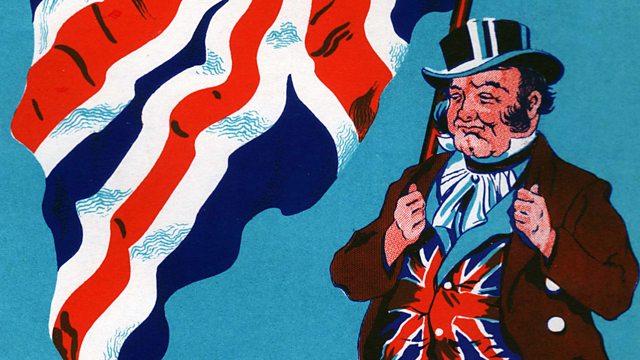Week 1 Omnibus
Anne McElvoy tells the stories of big challenges that have spurred leading British conservative thinkers into action, from the French Revolution to the growth of mass democracy.
Anne McElvoy tells the stories of big challenges that have spurred leading British conservative thinkers into action.
In this omnibus edition of the first five episodes, Anne traces the story of British conservatism from the French Revolution to the beginnings of mass democracy.
In 1790, the Revolution in France shocked progressive MP Edmund Burke into defending British traditions and privileges - sowing the seeds of British conservatism. Burke was no reactionary - he was a supporter of the American Revolution of the 1770s. But in the French Revolution he saw not liberation but bloodshed. He championed British tradition, from the right to own property, through the role of the Church, to the stabilizing effect of the House of Lords. Among the radicals aghast at Burke's heresy was a young Cumbrian poet, William Wordsworth. But having witnessed the impact of the Terror in Paris for himself, Wordsworth began to turn away from it, later becoming a leading conservative voice in early Victorian Britain.
By the 1830s and 1840s, the Industrial Revolution had brought vast changes to British life. It delivered innovation and prosperity, but chaos and disconnection too. In the industrial north of England in particular, unrest was growing. To the great Scottish writer and thinker Thomas Carlyle, it seemed as big a threat as the Revolution in France. In Carlyle's Chelsea Anne finds out how he fought back against the Industrial Revolution and the revolutionary idea it brought in its wake. Carlyle argued that the concept of Utilitarianism was forging a cold new world of atomized individuals. In response, he called for strong leadership and a return to medieval Christian values.
In the 1840s, industry, commerce and voting reform gave new power to the cities and the middle classes. But then the feudal aristocracy found an unlikely new champion. Benjamin Disraeli, a dandy Jewish London novelist, drew on the ideas of both Edmund Burke and Thomas Carlyle, and toured the cities of the industrial north, drawing on the suffering he saw in his novels. He set out to revive the romantic idea of rural landowners looking after the poor, and adapt it for the new era. Disraeli found his great cause in the battle over Free Trade. When Prime Minister Robert Peel decided to abolish the tariffs that protected British farmers from foreign corn imports, Disraeli united with rural aristocrat Lord George Bentinck to lead the charge against Peel, arguing that Free Trade would destroy a whole social system. But they lost - and it was Peel's championing of Free Trade which proved the more effective conservative move. His more open approach welcomed the new urban middle classes into politics.
By 1864, the troubles of the 1840s had been smoothed away by prosperity. The great Victorian critic John Ruskin was invited to Bradford to advise the prosperous merchants of the town on the style of their new Wool Exchange. But instead Ruskin lambasted them for ditching traditional values of taste and craft. They had become worshippers, he told them, of 'the Goddess of Getting-On.' Anne follows Ruskin to Bradford and discovers how, for this child of south London, the north of England came to represent both the crass prosperity of the time - and a very different vision of life. Ruskin was deeply influenced by William Wordsworth. He moved to the poet's native Lake District and set up guilds to foster an alternative to the factories and mills. He encouraged a return to small communal groups working the land and pursuing traditional crafts. Anne suggests that John Ruskin - like Carlyle and Disraeli - is an example of how some strands of nineteenth century conservatism had a surprising amount in common with socialism, because of their shared hostility to the costs of capitalism.
By 1867, Disraeli was Prime Minister, and championed a new Reform Act which gave urban working men the vote. Conservatives of both parties were deeply concerned about what this meant for the future. The leading conservative thinker and future Conservative Prime Minister Lord Salisbury damned the new Act as surrender. He opposed mass democracy, fearing the tyranny of the majority. But other conservatives found a way to appeal to the new voters. They adapted an old Tory tradition - that each class in society should respect the others' pleasures. They began to champion the working man's right to a quiet pint. And a group of 'Tory Democrats' set up the Primrose League - an organization designed to bolster conservatism in ordinary people. At its height, the League amassed a membership of two million, many of them women. All this showed that conservatism and democracy need not be opposites. In the end, even Lord Salisbury was reluctantly reconciled to the new order.
With: Professor Richard Bourke, Professor Dinah Birch, Dr Tristram Hunt MP, Professor Jon Lawrence, Professor Richard Aldous, Dr Matthew Roberts, Fern Riddell, Professor Krista Cowman
Producer: Phil Tinline.
Last on
More episodes
Previous
You are at the first episode
Broadcast
- Fri 6 Sep 2013 21:00麻豆社 Radio 4

